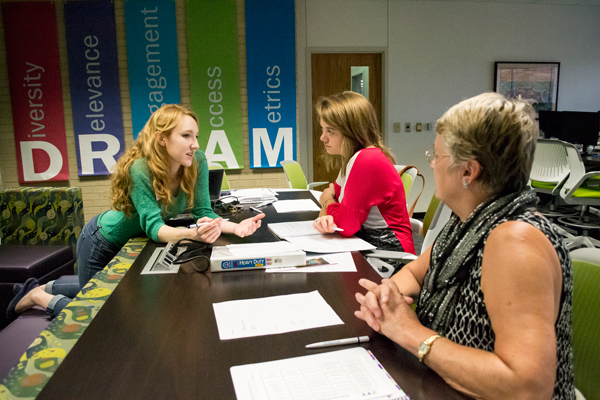By Tabitha Redder/managing editor
The Bridge is tightening the bond between faculty, staff and students on NW Campus.

The program, which had its first fall workshop session Sept. 12, targets at-risk students who are likely to drop out before finishing their degrees and students on academic success plans but is also broadening its scope to include any students who might find the workshops useful.
The Bridge is currently in the first out of three phases total, program coordinator Tia Cole said. The first phase consists of building a community of involvement and engagement that includes everyone on campus.
“We want students to not just come here, take a class and then leave because education takes more than that,” Cole said. “We are encouraging students to take advantage of all the services.”
The program began offering guidance and a few workshops during the summer, but it has greatly expanded its presence for the fall semester and currently offers a variety of workshops available to all students.
“They are designed to fill in the gaps of what’s happening in the classroom,” she said.
The program has collaborated with a majority of the service areas on campus and just recently included the math department in its master list of workshops for students seeking help.
The Men of Color Mentoring Program as well as individual instructors across campus have volunteered to give guidance to students within The Bridge who are on academic success plans or academic probation or who just request additional direction for their studies.
NW English associate professor Angela Chilton currently mentors two students in the program.
“They like having someone who works here, who teaches here and can answer questions for them and negotiate some of the red-tape kind of things of not knowing who to talk to,” Chilton said.
Students are matched with a mentor who will benefit their needs. Someone struggling in math will be paired with a math instructor. If the students’ concerns are in behavioral or life skills, they will be partnered with volunteers that will aid them in those issues.
“The two I mentor seem to be really enthusiastic about the program,” NW counselor Brentom Jackson said. “They’re interested in the workshops offered through the program and can see the benefit. It’s not just something they’re assigned to do.”
Jackson sees his students every other week but said the frequency of visits is determined on a case-by-case basis.
“The mentors are the main point of contact with the student, so if the student needs anything, they will go to their mentor first,” Cole said. “A lot of times a student will get stuck, or they hit a brick wall and I say, ‘Go talk to your mentor.’”
The next level in the program has yet to be implemented but will be called a “short-term blast,” where students complete a developmental education sequence or specialty program sequence in one term.
“The key is that we’re going to be wrapping our services around these students, so if they choose to do this accelerated version, we’ll have a mentor for them,” Cole said. “We’re not setting them up for failure. We want to support them throughout the process.”
Chilton sees the mentoring aspect of the program as a mutual benefit for both the instructors and the participants.
“It was really nice to make contact with a student I would not have otherwise met and get to know them on a different level, see what needs they had and how I could help with that,” she said.























